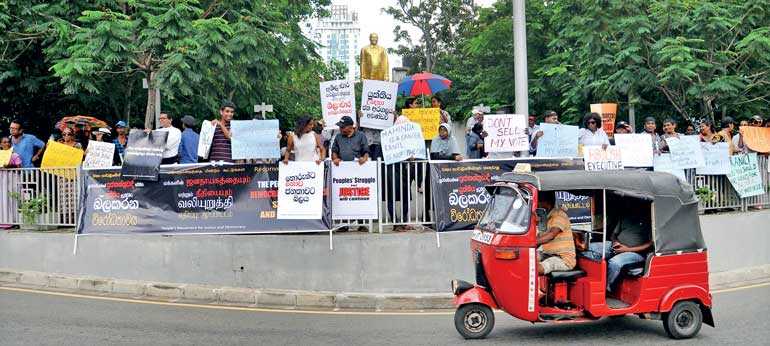Monday Feb 23, 2026
Monday Feb 23, 2026
Thursday, 8 November 2018 00:00 - - {{hitsCtrl.values.hits}}

We the people of Sri Lanka must protect the Constitution of the Republic as we protect our own lives – Pic by Ruwan Walpola
“...do hereby adopt and enact this CONSTITUTION as the SUPREME LAW of the DEMOCRATIC SOCIALIST REPUBLIC OF SRI LANKA.” (The Constitution of the Democratic Socialist Republic of Sri Lanka – Page xvii)
Above is the enactment clause of the Constitution of our Republic. The words “SUPREME LAW” are of utmost importance. It means our Constitution is above everything else. It is the Supreme. These days we hear some people say that the “Parliament is the Supreme”. It is a blatant violation of the Constitution of our Republic. Fortunately the citizens have now started to read their Constitution. The youth have begun to mindfully and actively engage in governance.
The era that most politicians, some lawyers and NGO staff members distorted the Constitution to deliberately mislead the Sri Lankan citizens is coming to an end. Democracy of the Republic has started to mature.
The sovereignty of the people 
“3. In the Republic of Sri Lanka sovereignty is in the People and is inalienable. Sovereignty includes the powers of government, fundamental rights and the franchise.” (The Constitution of the Democratic Socialist Republic of Sri Lanka (Page 1)
Sovereignty means the unlimited ownership of the Republic vested in the people. It is the absolute right of the people to control the Republic. Which means the full, complete and absolute ownership, control and dominion of the Republic is with us the people and nobody else. And us the people are the legal citizens of Sri Lanka living today and will be born in the future. That sovereignty is inalienable and can never ever be taken away from us, the people.
The foreign countries and foreigners do not have even a speck of ownership of the Republic of Sri Lanka. There is not even a microscopic right for any foreign country, foreign government or external organisation to interfere with the sovereignty of our Republic. Those who encourage such intervention MUST be identified as enemies of the Republic and duly prosecuted under the Supreme Law of the Republic.
The only witness to the sovereignty of the people is the Constitution. Without the Constitution we cannot prove the sovereignty of the people. Which is why for the past three-and-a-half years the treasonous oligarchs of the United National Party have been working to repeal the current Constitution and enact a new Constitution in order to nullify the sovereignty of the people. (Read the expose on the proposed Constitution titled “Sri Lanka Orumiththa Naduva” published by the National Joint Committee).
Therefore we the people of Sri Lanka MUST protect the Constitution of the Republic as we protect our own lives.
Execution of the sovereignty of the people
“4. The Sovereignty of the People shall be exercised and enjoyed in the following manner :– (a) the legislative power of the People shall be exercised by Parliament, consisting of elected representatives of the People and by the People at a Referendum; (b) the executive power of the People, including the defence of Sri Lanka, shall be exercised by the President of the Republic elected by the People; (c) the judicial power of the People shall be exercised by Parliament through courts, tribunals and institutions created and established, or recognised, by the Constitution, or created and established by law, except in regard to matters relating to the privileges, immunities and powers of Parliament and of its Members, wherein the judicial power of the People may be exercised directly by Parliament according to law;” (The Constitution of the Democratic Socialist Republic of Sri Lanka (Page 1)
Accordingly there are three sovereign powers of the people:
These powers are equal to one another. There is no place in our Constitution which states that any one power is greater or lower than another one or more power. Therefore, the parliament to which the people’s legislative power is delegated; the president to which the people’s executive power is delegated; and the courts to which the people’s judiciary power is delegated are equal in power. Therefore saying the parliament is supreme than the president is anti-constitutional.
The first Constitution of the Republic which was enacted in 1972 (by Sirimavo Bandaranaike’s Government) had a namesake president and a National State Assembly (predecessor to the parliament). Therefore it was right then to say the parliament is greater than the namesake president.
But for better or worse that construct is no longer valid after the 1977 Constitution (by J. R. Jayewardene Government) which redistributed the people’s sovereign powers by creating the Executive Presidency. Therefore those MPs who are saying that the parliament is supreme than the president is misleading you for their benefit. They have no such people’s power delegated by our Constitution.
Power balance
If the people’s legislative power; the people’s executive power; and the people’s judiciary power to be equal, they have to be balanced or controlled by each other. Therefore the parliament, the president and the courts should strictly act independently and upon each other.
And how that balancing happens is explained extensively and simply from Chapter VII to Chapter XVI of the Constitution. Therefore please buy a copy of our Constitution (Rs.400/-) or download the soft copy free of charge from the www.parliament.lk website and read it to understand how your powers are supposed to be executed.
Members of parliament
For better or worse, the members of parliament constantly change benches inside the parliament, change parties and policies. Although they have a Constitutional right to do so, such changes could preserve OR distort the people’s legislative power.
It depends on the “reason” for their change of benches, parties and policies. If the reason is to preserve the sovereignty of the people, then it is right and fair. But if it is to break the sovereignty of the people then it is a gross violation of our Constitution. A crime against the sovereignty of the people of the Republic.
The real Constitutional crisis
Parliament is not made Supreme by the Constitution of the Republic. What really happens is many of the Members of Parliament get together and collude to create a non-existent unconstitutional power for themselves and thereafter try to control the people through division tactics, bullying, coercion, misleading and degrading the sovereignty of the people.
Since 1977, a group of people who have been calling themselves Members of Parliament (MPs) has been trying to “control” the people of the Republic. That is not Democracy. It’s an Oligarchy. If you want to genuinely understand this crisis, you must first and foremost read the Constitution and understand your rights and obligations as citizens of the Republic.
The obligation of the people
If you seriously want to build a stronger democratic government, you the people must first read and understand your Constitution. Second, you the people must elect a right set of suitable, capable and accountable representatives as the president and the members of parliament to protect the constitution; while NOT electing unsuitable persons.
Using one of your key sovereign rights, your “vote” to knowingly elect unsuitable representatives is not only a violation of your own sovereignty but also the sovereignty of other citizens and that of your children’s. Therefore, let us the people now demand an immediate election to elect suitable representatives.
(The writer is Ambassador for Democracy Earth to Sri Lanka and can be reached via [email protected].)